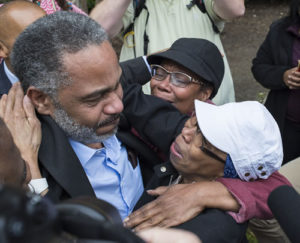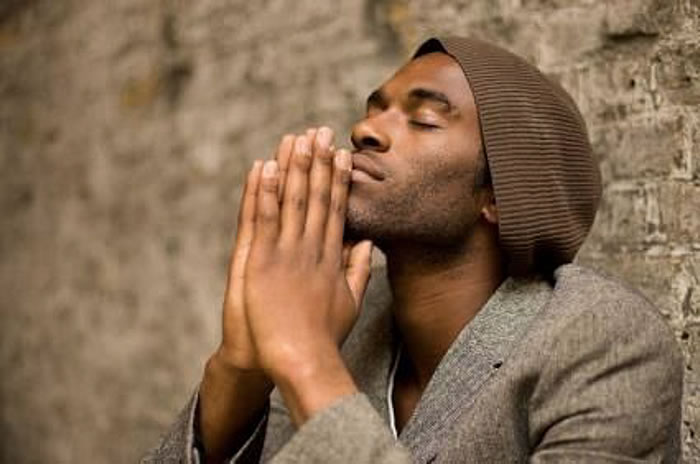Feed Your Faith, Starve Your Fears.

A few days ago, I had a chance to read The Marshall Project’s article “Freedom after 30-years on death row”. The article is about Mr. Anthony Hinton, a man who was wrongly convicted for a heinous crime which resulted in him serving 30 years on death row. While in prison, he explicitly explained how he witnessed more than fifty executions.
An experience such as his could easily break the average person’s spirit and faith in God, leaving one to wonder, “Where is God when I needed Him?” However, Mr. Hinton’s faith clearly outweighed his worry. He did not allow fear to take control of his spirit, heart, or mind. He continued to stand on the truth, that he was innocent and lean on God to see him through it.
God is Bigger Than Our Fears and Worries
In his interview, Mr. Hinton stated, “I prayed every night. I woke up on it. I went to sleep with it on my mind. Every night. That’s why I can tell you that I know it was the grace of God, and I know He heard my prayer.” If this isn’t a modern day example that God is real and takes care of His children – what is?!
As humans, it is natural for us to feel worried, anxious, and insecure. We wouldn’t be human if we did not worry, however, the kicker is that we should give those worries to God so that we are at peace with them. We realize that there are some problems that we cannot resolve, and in those times, we must have faith and trust in God to know that only He can change it.
God provided us with a playbook, the Bible, that helps us find our way through any experience, including worry. If we take a look at Philippians 4:6-7, it tells us that we should not “be anxious about anything, but instead take our worries to God and leave them there.” By faithfully praying and leaving our worries with God, we are trusting that He will take care of them.
While no one wants to worry, there is a purpose for it.
If everything went smoothly and we had no concerns, we wouldn’t need God, right?
Isn’t it ironic that when we are comfortable and life is like the Commodores’ ballad says, “Easy Like Sunday Morning”, our dependence on God diminishes? In this case, perhaps some of us might be guilty of spending less time in the presence of God because “all is well”.
But, sure as we hit raging storms, face hardships, feel threatened, we immediately go to God in constant prayer. Seems a little fickle, right? Or, seems like we are being a fair-weather believer and follower of God, which is not what God wants us to do. He wants us to come to Him at all times, not just when “we” have a need.
Worry is a Choice.
Let’s take a look at Matthew 6:25-27, the passage says, “Therefore I tell you, do not worry about your life, what you will eat or drink; or about your body, what you will wear. Is not life more than food, and the body more than clothes? Look at the birds of the air; they do not sow or reap or store away in barns, and yet your heavenly Father feeds them. Are you not much more valuable than they? Can any one of you, by worrying, add a single hour to your life?” This is where we are told to give our worries to God and leave them there.
LRPP: How can we lessen the time we spend worrying?
Look to God at all times.
When we worry, we are placing unnecessary time, effort, and value into things that are outside of our control. Instead of fretting, look to God for your strength and peace. He never leaves us and stands firm through the good and the bad times. He is not a fair-weather friend – He is our Father and is there when no one else will be. Only He knows everything about us and the situation. We cannot place time constraints on His moves.
Read our playbook, the Bible.
It is no secret that we are often faced with hardships on a daily basis. This is why it is important for us to turn to our playbook, have faith, and trust in God. When life seems too hard to bear, we must look to God and the Bible to guide us down the path He would have us to go. His Word is a lamp unto our feet during the darkest moments of our life.
Pray without surrender.
Let’s think about Paul. He experienced beatings, prison, and having his life threatened, but he never surrendered to the hardships. Paul continued to have faith and believe that God would take care of him. When we pray, we are placing our faith and love in God and acknowledging His goodness and existence. This pleases God, as does our faithful loyalty to the promises of God. Never give up.
Place our trust and faith in God.
At the root of it all, it is imperative that we trust God. If we fail to trust Him, all else is bound to fail. The Bible tells us to “Trust the Lord with all your heart, and lean not on your own understanding” (Proverbs 3:5–7). We must surrender every area of our heart and all of our great ideas over to God and trust in Him.
So, what’s the Play Call?
Recognize and acknowledge that God cares for us. He does not want us to worry and fearful; He will never leave us and there is no battle that He cannot win.
When we are faced with worry, we must step aside and let God have His way. Allow peace to take up residence in our hearts. Be faithful and NOT fair-weather believers. God wants “all of us” at all times – not just when “we” see fit to need Him.
Are you willing to play the L.R.P.P. cards and allow God to show you what He can do with your worries and fears?




